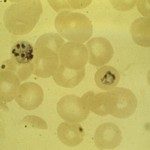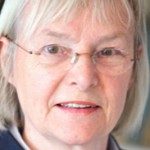Link to Pubmed [PMID] – 10444384
J Cell Sci 1999 Sep; 112 ( Pt 17)(): 2895-901
Regeneration of adult skeletal muscle is an asynchronous process requiring the activation, proliferation and fusion of satellite cells, to form new muscle fibres. This study was designed to determine the pattern of expression in vivo of the two myogenic regulatory factors, Myf5 and MyoD during this process. Cardiotoxin was used to induce regeneration in the gastrocnemius and soleus muscles of heterozygous Myf5-nlacZ mice, and the muscles were assayed for the presence of (beta)-galactosidase (Myf5) and MyoD. Adult satellite cells identified by M-cadherin labelling, when activated, initially express either MyoD or Myf5 or both myogenic factors. Subsequently all proliferating myoblasts express MyoD and part of the population is (beta)-galactosidase (Myf5) positive. Furthermore, we demonstrate that activated satellite cells, which express either Myf5 or MyoD, do not accumulate selectively on fast or slow muscle fibres.


